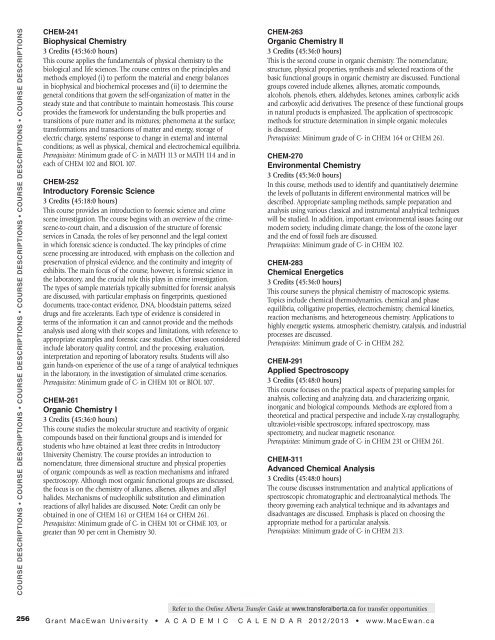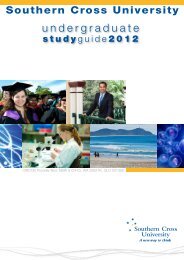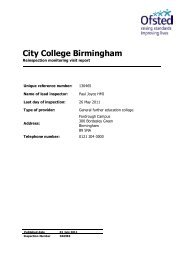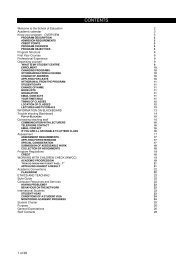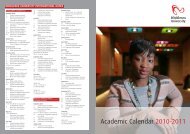Academic Calendar 2012/2013
Academic Calendar 2012/2013
Academic Calendar 2012/2013
You also want an ePaper? Increase the reach of your titles
YUMPU automatically turns print PDFs into web optimized ePapers that Google loves.
course Descriptions • course Descriptions • course Descriptions • course Descriptions • course Descriptions • course DescriptionsCHEM-241Biophysical Chemistry3 Credits (45:36:0 hours)This course applies the fundamentals of physical chemistry to thebiological and life sciences. The course centres on the principles andmethods employed (i) to perform the material and energy balancesin biophysical and biochemical processes and (ii) to determine thegeneral conditions that govern the self-organization of matter in thesteady state and that contribute to maintain homeostasis. This courseprovides the framework for understanding the bulk properties andtransitions of pure matter and its mixtures; phenomena at the surface;transformations and transactions of matter and energy, storage ofelectric charge, systems’ response to change in external and internalconditions; as well as physical, chemical and electrochemical equilibria.Prerequisites: Minimum grade of C- in MATH 113 or MATH 114 and ineach of CHEM 102 and BIOL 107.CHEM-252Introductory Forensic Science3 Credits (45:18:0 hours)This course provides an introduction to forensic science and crimescene investigation. The course begins with an overview of the crimescene-to-courtchain, and a discussion of the structure of forensicservices in Canada, the roles of key personnel and the legal contextin which forensic science is conducted. The key principles of crimescene processing are introduced, with emphasis on the collection andpreservation of physical evidence, and the continuity and integrity ofexhibits. The main focus of the course, however, is forensic science inthe laboratory, and the crucial role this plays in crime investigation.The types of sample materials typically submitted for forensic analysisare discussed, with particular emphasis on fingerprints, questioneddocuments, trace-contact evidence, DNA, bloodstain patterns, seizeddrugs and fire accelerants. Each type of evidence is considered interms of the information it can and cannot provide and the methodsanalysis used along with their scopes and limitations, with reference toappropriate examples and forensic case studies. Other issues consideredinclude laboratory quality control, and the processing, evaluation,interpretation and reporting of laboratory results. Students will alsogain hands-on experience of the use of a range of analytical techniquesin the laboratory, in the investigation of simulated crime scenarios.Prerequisites: Minimum grade of C- in CHEM 101 or BIOL 107.CHEM-261Organic Chemistry I3 Credits (45:36:0 hours)This course studies the molecular structure and reactivity of organiccompounds based on their functional groups and is intended forstudents who have obtained at least three credits in IntroductoryUniversity Chemistry. The course provides an introduction tonomenclature, three dimensional structure and physical propertiesof organic compounds as well as reaction mechanisms and infraredspectroscopy. Although most organic functional groups are discussed,the focus is on the chemistry of alkanes, alkenes, alkynes and alkylhalides. Mechanisms of nucleophilic substitution and eliminationreactions of alkyl halides are discussed. Note: Credit can only beobtained in one of CHEM 161 or CHEM 164 or CHEM 261.Prerequisites: Minimum grade of C- in CHEM 101 or CHME 103, orgreater than 90 per cent in Chemistry 30.CHEM-263Organic Chemistry II3 Credits (45:36:0 hours)This is the second course in organic chemistry. The nomenclature,structure, physical properties, synthesis and selected reactions of thebasic functional groups in organic chemistry are discussed. Functionalgroups covered include alkenes, alkynes, aromatic compounds,alcohols, phenols, ethers, aldehydes, ketones, amines, carboxylic acidsand carboxylic acid derivatives. The presence of these functional groupsin natural products is emphasized. The application of spectroscopicmethods for structure determination in simple organic moleculesis discussed.Prerequisites: Minimum grade of C- in CHEM 164 or CHEM 261.CHEM-270Environmental Chemistry3 Credits (45:36:0 hours)In this course, methods used to identify and quantitatively determinethe levels of pollutants in different environmental matrices will bedescribed. Appropriate sampling methods, sample preparation andanalysis using various classical and instrumental analytical techniqueswill be studied. In addition, important environmental issues facing ourmodern society, including climate change, the loss of the ozone layerand the end of fossil fuels are discussed.Prerequisites: Minimum grade of C- in CHEM 102.CHEM-283Chemical Energetics3 Credits (45:36:0 hours)This course surveys the physical chemistry of macroscopic systems.Topics include chemical thermodynamics, chemical and phaseequilibria, colligative properties, electrochemistry, chemical kinetics,reaction mechanisms, and heterogeneous chemistry. Applications tohighly energetic systems, atmospheric chemistry, catalysis, and industrialprocesses are discussed.Prerequisites: Minimum grade of C- in CHEM 282.CHEM-291Applied Spectroscopy3 Credits (45:48:0 hours)This course focuses on the practical aspects of preparing samples foranalysis, collecting and analyzing data, and characterizing organic,inorganic and biological compounds. Methods are explored from atheoretical and practical perspective and include X-ray crystallography,ultraviolet-visible spectroscopy, infrared spectroscopy, massspectrometry, and nuclear magnetic resonance.Prerequisites: Minimum grade of C- in CHEM 231 or CHEM 261.CHEM-311Advanced Chemical Analysis3 Credits (45:48:0 hours)The course discusses instrumentation and analytical applications ofspectroscopic chromatographic and electroanalytical methods. Thetheory governing each analytical technique and its advantages anddisadvantages are discussed. Emphasis is placed on choosing theappropriate method for a particular analysis.Prerequisites: Minimum grade of C- in CHEM 213.256Grant MacEwan University • A C A D E m I CRefer to the Online Alberta Transfer Guide at www.transferalberta.ca for transfer opportunitiesC A L E N D A R <strong>2012</strong>/<strong>2013</strong> • www.MacEwan.ca


